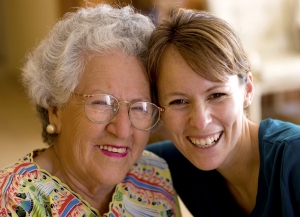Caregiving for a family member who has a chronic health condition is taxing for even the most resilient individuals. If you are a family caregiver, it is essential for you to take steps to support and maintain your own wellbeing.
With the aging of the U.S. population, more people find themselves in the role of caregiver for an older adult who has a chronic health condition such as dementia, physical disability, cancer, and other serious illnesses. Consistently, those in a caregiving role report high levels of stress. This stress is compounded for those individuals who have careers and families of their own.
Whether the caregiving role is one you’ve prepared for and willingly taken on or is something that comes as a surprise addition in an already busy life, the stress of caregiving is very real. Fortunately, there are things you can do to prevent caregiver burnout and support your own wellbeing, including
- Creating a support network
- Asking for help
- Practicing mindfulness
- Keeping a Self-care Routine
- Recognizing Caregiver Stress Warning Signs
1. Create a Support Network
It’s essential to build your support network early in your caregiving role. Look for support groups offered through local hospitals, libraries, area agencies on aging, senior centers, and mental health advocacy organizations. Through these groups, you will find helpful resources, guidance for dealing with difficult situations, and the invaluable insights of those who have already navigated caregiving challenges.
2. Ask for Help
Knowing where to find, and having access to support is not the same as asking for help. If you are overwhelmed, showing signs of caregiver stress (see below), then you must put ego aside and ask for the help you need. Your loved one’s medical provider or patient advocate froma local hospital or support group is a good place to start.
3. Practice Mindfulness
Mindfulness is not only for people who meditate. You can learn to bring mindfulness strategies into daily life—from folding laundry to walking the dog. You can also cultivate a formal mindfulness practice, which has been shown to significantly reduce stress, chronic pain, and symptoms of depression and anxiety. Many community programs such has yoga studios, parks and recreation, YMCA/YWCA offer mindfulness groups or look for a mindfulness-based stress reduction program for caregivers offered through a local hospital or medical arts organization.
Also, see the Zen Caregiving website for resources.
4. Self-care is Essential for Caregivers
There are three things caregivers can focus on to maintain their own wellbeing: sleep, balanced nourishment, and daily physical movement.
Sleep is essential to overall health and wellbeing. During sleep, the body recovers, heals, and develops innate resources to support how we live, work and play during waking hours. One sure sign that you are getting sufficient sleep is waking-up feeling refreshed and restored. If you don’t awake most mornings feeling this way, then you may want to create a sleep routine. A healthy sleep routine includes going to bed and waking the same time each day; using room darkening curtains; lowering the room temperature; and not using digital devices in the bedroom with the hour before going to sleep.
Balanced nourishment means including a variety of real, whole foods in your diet—and enjoying sweets and treats in moderation If you eat mostly packaged and boxed foods, your body is not taking in the vitamins and minerals and fuel nutrients (carbs, protein, healthy fats) that it needs for optimal function. Without a balanced diet, you will feel the effects of stress more sharply and you are likely to throw-off your sleep routine, which compounds stress. If you need some guidance on healthy eating to support your caregiver role, local hospitals and wellness centers usually offer nutrition workshops.
Physical Movement – While vigorous physical activity a few times a week is ideal, it may not be realistic for you as a caregiver, to get 3 or 4 workouts in a week. Instead, aim for daily physical movement that gets your heart rate up for 30 minutes. This can be a walk, bike ride, working in a garden, yoga, taking a fitness class, or turning on music and dancing in your living room. Movement releases hormones that help support a positive mood, strengthens and tones the body, and helps relieve stress. Find something you enjoy and move every day!
5. Know the Warning Signs of Caregiver Stress
The stress of caregiving puts the caregiver at risk for health problems such as burnout, anxiety, depression, chronic fatigue, headache, sleep disturbances, and relationship tension. Warning signs of caregiver stress and burnout can include:
- Feeling alone
- Feeling helpless or depressed
- Isolating from friends
- Loss of interest in activities you usually enjoy
- Diminished quality of important relationships
- Inability to fall asleep or stay asleep
- Reduced capacity for coping or problem-solving
- Feeling guilty for taking time for yourself
- Persistent sense of worry or dread
- Feeling tired often
- Sleeping too much or not enough
- Gaining or losing weight
- Becoming quick to anger or frustration
- Misusing alcohol or drugs, including prescription medicines
- Missing your own medical appointments
- Missing work due to caregiving demands
If you are experiencing symptoms such as these, it is imperative to seek support and medical guidance so that you can recover your wellbeing and continue to be of support for your loved one.
These are just a few of the many approaches to self-care for caregivers. Additional resources can be found at Mayo Clinic and the Caregivers Actions Network.
If you find the caregiver role has become more burdensome than you can manager and still maintain your health and wellbeing, it may be time to consider other options for your frail loved one. Everbrook Senior Living offers support in helping you make this decision along with the resources and options necessary for placing an elderly older adult in assisted living care.



